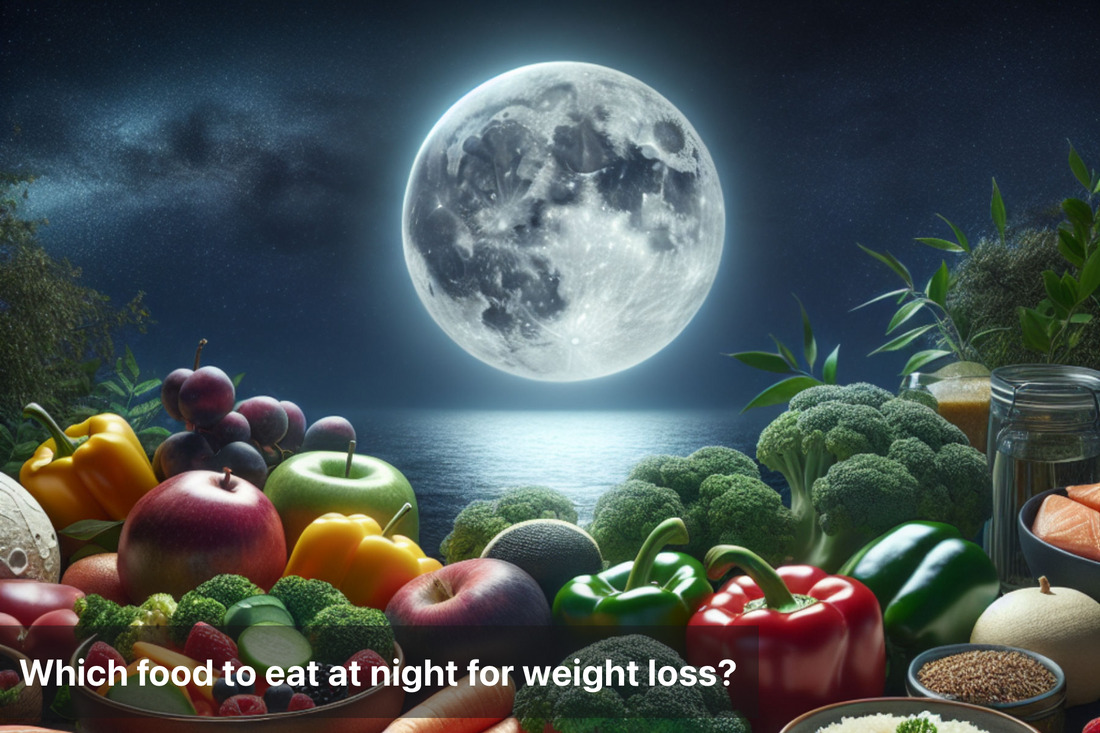
Which food to eat at night for weight loss?
Share
Many people grapple with the concept of nighttime eating and its effect on weight loss. It’s a common belief that indulging in food late in the evening leads to weight gain, which raises significant concerns for those trying to shed extra pounds. However, it’s not simply about the timing of meals but also the types of food consumed.
When considering what to eat at night for weight loss, choosing healthier options can make a difference. Satisfying hunger with nutritious snacks rather than heavy or processed foods can support your weight loss goals. There’s a clear distinction between mindful eating and late-night bingeing.
Incorporating lean proteins, whole grains, and vegetables into your evening snacks can prevent overeating while also providing the necessary energy your body craves. This strategic approach not only aids in weight loss but also improves overall well-being.

Why Nighttime Cravings Matters
Late-night hunger often stems from a variety of factors and understanding these can help you make better choices.
-
Metabolism at Night: While your metabolism slows during sleep, it doesn’t stop. Choosing low-calorie, nutrient-rich foods helps fuel your body without promoting fat storage.
-
Preventing Overeating: A planned nighttime snack can prevent unhealthy cravings and binge eating.
-
Promoting Better Sleep: Certain foods can enhance sleep quality, which is crucial for weight management.
Nutrition Table for a Weight Loss Friendly Nighttime Foods
|
Nutrient |
Recommended Amount (Per Serving) |
Example Foods |
|---|---|---|
|
Calories |
100-200 kcal |
Greek yogurt, almonds |
|
Protein |
8-15 g |
Cottage cheese, boiled egg |
|
Carbohydrates |
10-20 g |
Oatmeal, whole-grain toast |
|
Fiber |
3-5 g |
Vegetables, chia seeds |
|
Healthy Fats |
5-10 g |
Avocado, walnuts |
Top Foods to Eat at Night for Weight Loss
When it comes to nighttime eating, choosing the right foods can significantly impact your weight loss efforts. Here are some effective options that fall under the category of night food for weight loss.
1. Greek Yogurt
Rich in protein and low in calories, Greek yogurt helps repair muscles and keeps you full.
Benefits:
-
High in casein protein for slow digestion.
-
Promotes gut health with probiotics.
2. Cottage Cheese
A favorite among fitness enthusiasts, cottage cheese is a low-fat, high-protein snack.
Benefits:
-
Rich in casein, it provides sustained energy overnight.
-
Aids in muscle repair and growth.
3. Hard-Boiled Eggs
Eggs are a quick, nutrient-dense option for nighttime snacking.
Benefits:
-
High in protein and healthy fats.
-
Keeps you satiated and prevents late-night cravings.
4. Almonds
Almonds are packed with healthy fats, protein, and magnesium.
Benefits:
-
Supports muscle relaxation for better sleep.
-
Aids in weight loss by curbing appetite.
5. Vegetables with Hummus
Crunchy vegetables paired with hummus make a satisfying, low-calorie snack.
Benefits:
-
High in fiber to support digestion.
-
Provides vitamins and minerals without excess calories.
6. Oatmeal
A small bowl of oatmeal can be a comforting and filling choice.
Benefits:
-
High in fiber and low in calories.
-
Promotes better sleep due to melatonin and magnesium.
Incorporating these foods into your late-night snack routine can help you manage hunger while you work towards your weight loss goals.
Health Coach Pooja Shinde (MSc. Nutrition, food science & technology — diabetes educator) says “Weight loss isn’t about depriving yourself; it’s about nourishing your body with the right foods at the right time.”

Healthy Eating Habits for Late Night Snacking
When it comes to late-night snacking, developing healthy eating habits is crucial for weight management.
-
Watch Portion Sizes: Keep your nighttime snacks between 100-200 calories.
-
Choose Protein-Rich Foods: Protein helps repair muscles and keeps you full.
-
Avoid Sugary Snacks: High-sugar foods can cause blood sugar spikes and hinder weight loss.
-
Stay Hydrated: Sometimes, late-night hunger is mistaken for thirst.
-
Time Your Meals: Eat your last meal or snack 1-2 hours before bedtime.
Summary
Making informed food choices at night is crucial for those aiming to lose weight. As discussed, nighttime eating often raises concerns but understanding what to eat can minimize the impact on your weight loss journey. Favoring healthy snacks over heavier meals is essential when you feel hungry after hours. It's vital to choose options that are not only low in calories but also satisfying.
When considering what to eat at night for weight loss, focus on nutrient-dense foods that can curb cravings without derailing your efforts. Foods rich in protein, fiber, and healthy fats can contribute to feelings of fullness and help you resist the temptation to overindulge.
Additionally, monitoring portion sizes will aid in managing your caloric intake. Instead of traditional snacks, think of items like Greek yogurt, almonds, or vegetables with hummus. Each of these choices qualifies as "night food for weight loss," supporting your goals even during late hours.
FAQs
1. Is eating at night bad for weight loss?
Not necessarily. Eating healthy, low-calorie foods in moderation can support weight loss and prevent unhealthy cravings.
2. What foods should I avoid eating at night?
Avoid high-sugar, high-fat, and processed foods such as chips, cookies, and ice cream.
3. Can I eat carbs at night and still lose weight?
Yes, but choose complex carbs like oatmeal or whole grains, which provide sustained energy and promote better sleep.
4. How can I avoid late-night cravings?
Plan a healthy snack in advance, stay hydrated, and ensure your dinner is balanced with protein, fiber, and healthy fats.
5. Does eating at night affect sleep quality?
Certain foods, like almonds, bananas, and oatmeal, can improve sleep quality by boosting melatonin and magnesium levels.
